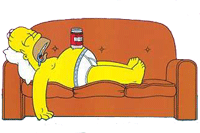Have you ever found yourself hitting a plateau (or even regressing) on your path to total poker domination? Unfortunately learning isn’t always a nice linear path so it’s not uncommon to find yourself stuck. Getting un-stuck can be one of the biggest challenges a prospective poker god faces so I’ve put together some tips to help get you out of your poker rut.
1. Tighten up
It’s pretty common advice but it can really be helpful. Not only does tightening up mean that you’ll play fewer hands but you should use the experience to really contemplate and attempt to understand hand strength. Many leaks happen pre-flop and once made those errors often lead to more errors in your post-flop play.
Sure, we all know our starting hand guides (we do remember them, don’t we?) but if you cut back to only the premium hands and let your VP$IP drop to 14% or so, you should begin to notice how ugly some of those situations you used to get yourself into really are.
 Another benefit you’ll experience is discipline. It should feel good to toss that marginal hand into that muck knowing that you have the discipline to wait for your shots. You’re dictating when you want to mix it up and in most cases you’re going to have way the best of it.
Another benefit you’ll experience is discipline. It should feel good to toss that marginal hand into that muck knowing that you have the discipline to wait for your shots. You’re dictating when you want to mix it up and in most cases you’re going to have way the best of it.
2. Take a break
Yes, sometimes not playing is the best way to advance. Hey, we all get burned out every once in awhile so don’t keep pushing it. Let your mind take a break. It’s a well-known fact that it’s more difficult to solve a problem when you’re actively thinking about it than when you let your subconscious mull it over in the background. So give it a rest for a bit and come back to the game when your mind has had some time to process it all.
3. Re-read a book
I’ve written about this in the past but I think people buy too many poker books. Re-read what you have. You’re at a pretty elite level if the breakthrough you need isn’t already contained in the books you already own. Chances are that whatever poker demon you’re wrestling with has a solution in one of the core poker readings.
 I feel somewhat like a hypocrite because I pretty much read every poker book that comes out but I do that mostly because this game is what I do for a living and I’m constantly asked for my opinions on various books or authors (plus they always make for an easy blog post). That being said though, I do have about 3 or 4 books that are my core poker books. I have read them and re-read them many, many times. I refer to them often and when I analyze hands I attempt to reference those books in my reasoning.
I feel somewhat like a hypocrite because I pretty much read every poker book that comes out but I do that mostly because this game is what I do for a living and I’m constantly asked for my opinions on various books or authors (plus they always make for an easy blog post). That being said though, I do have about 3 or 4 books that are my core poker books. I have read them and re-read them many, many times. I refer to them often and when I analyze hands I attempt to reference those books in my reasoning.
4. Seek advice
I’ve recommended poker coaching in the past and while I know not everyone can afford it or may not think their game is far enough along to fully enjoy the benefits of coaching, at least find another player you can talk to.
I was fortunate enough to get hooked into this whole poker blogging world and met so many talented players that I’ve always had people I could turn to. When I’ve hit those learning plateaus I’ve always had people I could analyze hands with. If you don’t have people like that in your life right now, go find them. The forums on 2+2 and Pocket 5’s are excellent places to go if you don’t have any close friends to hit up. Even with the quality stable of friends I have, I still go through forums and read hand analysis postings daily. Post some hands and ask for some advice.
 5. Drop down in limits
5. Drop down in limits
It’s a bit of an ego crush to drop down in limits but it can be very helpful. And it’s not entirely about the money. I know that if I play below my normal limits, I can view the game a little more philosophically. The opponents aren’t as tough so it frees up a few brain cycles that allow me to think about parts of the game that I might overlook when locked in battle with tougher opponents.
In fact, I’ve grown to like playing lower limits. It’s not uncommon to find me online playing anything from 0.50/$1 to $3/$6 limit just for kicks. Sometimes I just want to unwind after work and I get the same release from playing a low limit game as I might from throwing Call of Duty into my Xbox360.
But don’t just let it be a donk session. Play your best game. Use those sessions to help you focus. Taking the emotion of having serious money on the line (and serious is relative) out of the equation can often help you find those little flaws in your game.
6. Move up in limits
I know I just said that moving down in limits can help you improve your poker game so saying moving up in limits sounds a little crazy, no? It’s not crazy at all if you’re in the right mental place. There was a point when I was playing $5/$10 when I just felt stagnate. I was a winning player at that level for long enough to know it wasn’t a fluke but somewhere along the line I started to regress. I wasn’t playing my best game anymore and it didn’t take long for my results at the table to reflect that fact. HDouble had been prodding me for months to step up to the $15/$30 game but I felt that if I couldn’t beat the $5/$10 I would get slaughtered at $15/$30. But HDouble had seen my A-Game and knew I could play at the level and win so he kept on prodding until I finally worked up the nerve. Moving up forced me back into my A-Game. I couldn’t afford to play like I had been playing at $5/$10. Being pushed back into playing an A-Game really helped me get my game back in order.
The important thing here is that you need to have an A-Game and you need to be playing less than your A-Game. If you’re struggling to beat the $3/$6, moving up to $10/$20 isn’t going to improve your game. The only thing it’s going to do is relieve you of your bankroll. You need to be a winning player who for whatever reason has gotten lazy or bored and needs a challenge to get your game back.
7. Play fewer tables
The cold hard truth here is that every table you open divides your ability to concentrate and focus. I know guys who can 8 or 10 table but their win rate goes down at each table. For example, if you could make 3BB/100 at 1 table and you play two tables your win rate is probably going to drop to something like 2.5BB/100. And with three tables it’s going to go down to 2BB/100. Those numbers aren’t absolutes. They’re going to be different for every player but the idea is that cutting back allows you to play better. The reason the win rate drops as you increase tables is because you can’t concentrate on each table as effectively as you would on a single table, which means more errors and/or missed opportunities. You can still be profitable playing 10 tables (I can’t but some people can) because the increased hands per hour *may* make up for the lower BB/100 but at some point you will hit a tipping point where the costs outweight the benefits.
I’ve always been a 4 table max person. I can’t play more games than that even if the games are uber-soft. But when I was moving up the limits I would always cut back to just two tables when I moved up. When I was playing 4 tables of $2/$4 I cut back to 2 tables when I moved up to $3/$6. And if I was having a particularly rough time I would cut it back to 1 table until I was winning consistently.
If you’re looking at your game and not happy with your results, consider backing off the number of tables you play.
8. Take better notes
This is another one of those pieces of advice that force you into the philosopher mode. It’s funny but when you’re concentrating on noticing all of the little flaws in your opponent’s game, it helps you stand back and objectively assess your own game. Sometimes I won’t even be playing at a table and I’ll just watch and make notes on the players. Maybe I’ll be up against those players one day and maybe not but watching, paying attention, and articulating my thoughts in the form of player notes always allows me to walk away with some little nugget to think about.
9. Do some psycho-analysis mumbo jumbo
 Nine times out of ten, we’re our own worst enemy at the table. I won’t go into details but there was a period where I wasn’t very happy with some aspects of my life. And being unhappy and not doing anything about it started to make me bitter and angry inside. On the outside I’m not sure if many people noticed but after a few drinks or at a poker table it became very noticeable. I used those vehicles as a way to vent my aggression. All the angriness I felt at myself for not changing what was making me unhappy got reflected outward at others when I was at the tables. Eventually I did change the things that were making me unhappy and all those unhealthy feelings and aggression went away.
Nine times out of ten, we’re our own worst enemy at the table. I won’t go into details but there was a period where I wasn’t very happy with some aspects of my life. And being unhappy and not doing anything about it started to make me bitter and angry inside. On the outside I’m not sure if many people noticed but after a few drinks or at a poker table it became very noticeable. I used those vehicles as a way to vent my aggression. All the angriness I felt at myself for not changing what was making me unhappy got reflected outward at others when I was at the tables. Eventually I did change the things that were making me unhappy and all those unhealthy feelings and aggression went away.
The lesson here is that one of the best things you can do for your game is fix the parts of your life that have nothing to do with your game. If your head isn’t in the right place you need to do what you need to do to get it there. If it’s something you can change, change it. If you need someone to talk to, find someone and talk to them. Whatever you do, don’t go to the tables with your problems and try to work them out there. It doesn’t work that way.
10. Watch some poker on television
I don’t recommend this for the quality of play because sometimes it can be downright atrocious. With all of the editing and very event driven nature of television programming you may not see the best playing in the world but it can still be used as a tool to help improve your poker game. Watch the game and try to figure out why players are making particular plays. High Stakes Poker on GSN is better than most but you can still learn from other programs. The important part is that you need to be able to sit back and analyze the play. Ask yourself questions like “How did Doyle know he was beat there?” or “What kind of hand is Daniel putting him on?” These guys are pros. This is how they make a living and I can guarantee you that they know the answers to those questions so trying to get into their heads can be a challenge with a significant payoff. And not being personally involved in the game allows you that objectivity that you might not otherwise have.
Quality post, Bill.
Glad to see that you mentioned moving up in limits as a way to improve. That has been a key for me many, many times.